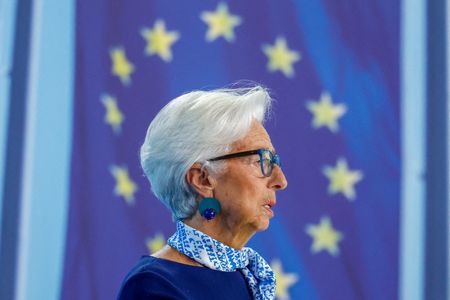By Balazs Koranyi
AMSTERDAM (Reuters) -Europe should avoid the temptation of easing bank regulation and should instead tighten rules for parts of the financial sector now enjoying easier rules, some of the continent’s top central bankers said on Friday.
Governments in Europe are debating whether to follow the Trump administration’s efforts to roll back rules put in place after the 2008/2009 global financial crisis, with some arguing that the regulatory burden is actually holding back investment, spending and ultimately economic growth.
A key source of tension is that non-bank financial firms, such as investment funds, insurers or hedge funds, enjoy much easier rules since they do not take household deposits and this allows them to grab market share from traditional lenders.
LEVEL UP, DON’T EASE
“It is vital that policymakers adapt regulation and supervision to this challenging environment,” European Central Bank President Christine Lagarde said in a speech in Amsterdam.
“They should do so not by lowering standards for banks, but by levelling them up for non-banks that are involved in bank-like activities, or with significant links to the banking sector,” she said. “That helps to address banks’ concerns about the uneven playing field.”
Policymakers fear that in a crisis, the central bank will be called upon to provide non-banks a liquidity lifeline given how deeply they are intertwined with regular banks.
CASE FOR SIMPLIFICATION
Bank of England Governor Andrew Bailey also warned about the danger of rolling back financial regulation as memories of past crises fade, and said central banks needed to keep close track of new potential threats.
“There is … a growing risk that because of this, as the pro-cyclical tide turns, we are inhibited from collecting necessary data in new areas of risk,” he said in a prepared text for the event.
British finance minister Rachel Reeves has said she wants to scale back regulation, which she believes is holding back growth in the economy.
Bailey said he did not think that tougher regulation of banks in Britain after the 2008 global financial crisis was to blame for a lack of investment and weak productivity growth in the years since.
But he did make the case for simplification, like adoption of a simpler capital regime for small deposit takers, in the so-called ‘Strong and Simple’ regime.
Isabel Schnabel, an ECB board member in charge of market operations, also spoke out against easier regulation, warning that a ‘race to the bottom’ would fuel instability that could sow the seeds of a future crisis.
“Rather than softening bank regulation, we should make sure that those areas of the financial system that pose new risks to the economy and banks, such as non-banks or stablecoins, are regulated appropriately without stifling innovation,” Schnabel told the same event.
Calling stablecoins the most important digital development in recent years, Schnabel warned that they have created new interconnections between banks, crypto markets and traditional asset markets, which could create liquidity stress.
Stablecoins combine money-like demandable liabilities with reserve assets that could turn illiquid during crises, Schnabel warned.
She also noted that if depositors shift into stablecoins backed by bank deposits, stable retail deposits are replaced by more concentrated and potentially more volatile wholesale deposits, increasing the risk of sudden outflows.
(Additional reporting by David Milliken and Yoruk Bahceli; Editing by Toby Chopra and Susan Fenton)











